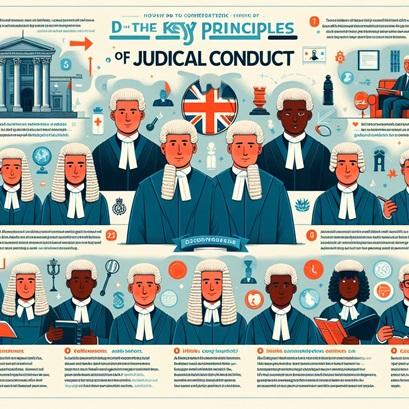The Guide to Judicial Conduct – Revised July 2023, published by the judiciary, is intended to assist judges, tribunal members, coroners and magistrates, in relation to their conduct.
The Guide to Judicial Conduct, amongst other things, states that judicial office holders are expected to display diligence and care in the discharge of judicial duties.
The Guidance is based on the principle that responsibility for deciding whether or not a particular activity or course of conduct is appropriate rests with each individual judicial office holder.
The Guide is therefore not a code, nor does it contain rules other than where clearly stated. It contains a set of core principles which will help judicial office holders reach their own decisions.
In January 2023, the Lady Chief Justice and Senior President of Tribunals asked the Judicial HR committee, who are the representative body for the entire judiciary, to revise the Guide again to reflect changes in wider aspects of judicial and public life.
UK Supreme Court Guide to Judicial Conduct
The United Kingdom Supreme Court published a Guide to Judicial Conduct (2019).
Every court should have a Code of Judicial Conduct that sets out the standards of ethical conduct to be expected of the Court. Such a Code serves a number of purposes. It provides guidance to the members of the Court. It informs those who use the Court of the standards that they can reasonably expect of its judges. It explains to members of the public how judges behave and should help to secure their respect and support for the judiciary.
Rt Hon. the Baroness Hale of Richmond DBE
The Judicial Committee of the Privy Council Guide to Judicial Conduct
The Judicial Committee of the Privy Council have also published a Guide to Judicial Conduct (2019).
Judicial Conduct Investigations Office (JCIO)
The Judicial Conduct Investigations Office (JCIO) is responsible for investigating complaints about the personal conduct of judges, as well as their professional conduct. It has the power to investigate complaints made by members of the public, legal professionals, and other judges.
The JCIO’s investigations are carried out by a team of investigators who are independent of the judiciary.
Judicial Conduct Investigations Office (JCIO) Disciplinary Statements
You can check if a a judge has had any disciplinary action against them as Disciplinary statements are published on the JCIO website and are sorted by year.
The JCIO publication policy states that a statement will normally be published when a disciplinary sanction has been issued to a judicial office-holder for misconduct.
The Lady Chief Justice and Lord Chancellor may decide jointly to:
- issue a statement in any case;
- decline to issue a statement in any case;
- delete a statement prior to the expiration of the relevant publication period.
Misconduct by Senior Judiciary
These people are expected to be addressed as “Your Honour”! In a real business they would have been fired ! Can you Criticise a Judge ?
“The Lady Chief Justice, with the Lord Chancellor’s agreement, has issued Recorder Simon Myerson with formal advice for misconduct after he posted inappropriately on Twitter (now known as X).”
“The Lady Chief Justice and Lord Chancellor agreed with the nominated judge that HHJ Gerald’s actions fell short of the standards expected of a judge and that his actions amounted to judicial misconduct.”
“The Lady Chief Justice, with the Lord Chancellor’s agreement, has issued His Honour Judge (HHJ) Jan Luba with formal advice for misconduct.”
Check out our articles on Judiciary, JCIO, HHJ Farquhar, HHJ Bedford and the highly questionable Sussex Family Justice Board.
Read the reviews of Gavin Howe Barrister
“He is awful, underhanded and should not be practising law!”
Latest Articles
- What is a Paralegal ?A paralegal is a legal professional who performs tasks that require knowledge of legal concepts but does not hold the… Read more: What is a Paralegal ?
- What is a Judgment ?A judgment, also known as a judicial decision or court ruling, is the final decision made by a court of… Read more: What is a Judgment ?
- What is an Adverse Inference ?Adverse inference is a legal principle that plays a significant role in various areas of law, including criminal, civil, and family law. It arises… Read more: What is an Adverse Inference ?
- BarristersA barrister is anyone who has been Called to the Bar in England and Wales. For a barrister to offer… Read more: Barristers




